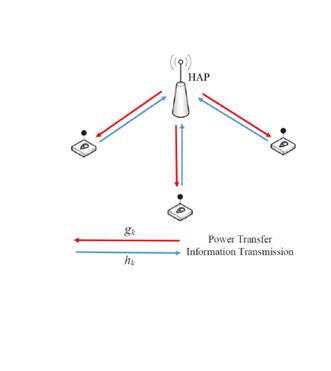Energy-Efficient Resource Allocation in Wireless Energy Harvesting Sensor Networks
Objective
Investigated the energy-efficient resource allocation in WEHSN with constraints on time scheduling parameters and transmission power consumption, where an EH sensor is allowed to transmit its data if the amount of its harvested energy is more than the consumption power.
Abstract
In this project, we mainly concentrate on harvesting the energy in WSN. The Energy Harvesting (EH) sensors have been proposed to overcome the mentioned problem in recent years. These sensors can harvest their required energy from environment in different methods, resulting in longer life time.
We consider a TDMA based Wireless Energy Harvesting Sensor Network (WEHSN) in which the time slot consists of two time intervals, the first one is utilized to absorb energy whereas the second one is used to transmit the sensors’ data.
We investigate the energy efficient resource allocation in WEHSN with constraints on time scheduling parameters and transmission power consumption, where an EH sensor is allowed to transmit its data if the amount of its harvested energy is more than the consumption power.
We derive the closed form expression for the optimization problem, corresponding to the energy efficiency and convert it to a parametric form, using Dinkelbach method. Then, we solve the new problem using Karush-Kuhn-Tucker (KKT) conditions. The numerical results shows the effectiveness of the proposed method.
Keywords: Energy Harvesting, Resource Allocation, Energy Efficiency, Wireless Sensor Networks, WEHSN.
NOTE: Without the concern of our team, please don't submit to the college. This Abstract varies based on student requirements.
Block Diagram

Specifications
Software & Hardware Requirements:
Software: Matlab 2018a or above
Hardware:
Operating Systems:
- Windows 10
- Windows 7 Service Pack 1
- Windows Server 2019
- Windows Server 2016
Processors:
Minimum: Any Intel or AMD x86-64 processor
Recommended: Any Intel or AMD x86-64 processor with four logical cores and AVX2 instruction set support
Disk:
Minimum: 2.9 GB of HDD space for MATLAB only, 5-8 GB for a typical installation
Recommended: An SSD is recommended a full installation of all Math Works products may take up to 29 GB of disk space
RAM:
Minimum: 4 GB
Recommended: 8 GB
Learning Outcomes
- Introduction to Matlab
- What is EISPACK & LINPACK
- How to start with MATLAB
- About Matlab language
- Matlab coding skills
- About tools & libraries
- Application Program Interface in Matlab
- About Matlab desktop
- How to use Matlab editor to create M-Files
- Features of Matlab
- Basics on Matlab
- Basics of wireless sensor networks
- About transmission of information and power.
- How system modal can be formed in Matlab.
- Construction of algorithm according to system modal
- Analyzing and visualization of plots.
- About energy harvesting in sensor networks.
- Phases of data transmission:
- Generation of input data
- Construction of WSN nodes
- How to extend our work to another real time applications
- Project development Skills
- Problem analyzing skills
- Problem solving skills
- Creativity and imaginary skills
- Programming skills
- Deployment
- Testing skills
- Debugging skills
- Project presentation skills
- Thesis writing skills





 Paper Publishing
Paper Publishing
